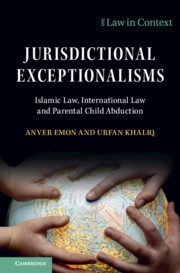Book contents
- Jurisdictional Exceptionalisms
- Law in Context Series
- Jurisdictional Exceptionalisms
- Copyright page
- Dedication
- Contents
- Tables
- Preface and Acknowledgements
- Abbreviations
- 1 Introduction
- Part I
- Part II
- 4 Islamic Law and Child Custody
- 5 Jurisdictional Exceptionalism and Islamic Law
- 6 Private International Law, Muslim Family Law States, and Strategic Jurisdiction
- 7 Conclusion
- Bibliography
- Index
4 - Islamic Law and Child Custody
from Part II
Published online by Cambridge University Press: 23 July 2021
- Jurisdictional Exceptionalisms
- Law in Context Series
- Jurisdictional Exceptionalisms
- Copyright page
- Dedication
- Contents
- Tables
- Preface and Acknowledgements
- Abbreviations
- 1 Introduction
- Part I
- Part II
- 4 Islamic Law and Child Custody
- 5 Jurisdictional Exceptionalism and Islamic Law
- 6 Private International Law, Muslim Family Law States, and Strategic Jurisdiction
- 7 Conclusion
- Bibliography
- Index
Summary
Chapter 4 examines the historic Islamic Law rules and assumptions which underpin issues relating to the custody of children. These historic rules have over time evolved into the modern Family Law of many, if not all, Muslim Family Law States on matters pertaining to child custody. The assumptions about, amongst others, what is in the ‘best interests’ of the child, the role of the mother and the obligations and duties of fathers are unpacked through a close reading and analysis of these rules, from both the pre-modern legal tradition and through two extended case studies (Qatar and Pakistan). Only once the assumptions underlying these rules on jurisdiction and custody, now adopted in Muslim Family Law States, are duly understood can we appreciate the obstacles that need to be tackled on parental child abduction matters. Examining how courts in Pakistan and Qatar approach the issue at hand, we identify how the historical rules have manifested themselves in practice in modern nation states.
Keywords
- Type
- Chapter
- Information
- Jurisdictional ExceptionalismsIslamic Law, International Law and Parental Child Abduction, pp. 147 - 217Publisher: Cambridge University PressPrint publication year: 2021



